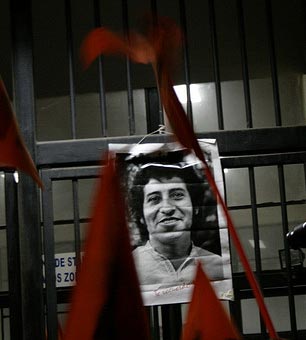The decades-long call for justice in the murder case of legendary Chilean folk singer Víctor Jara took another dramatic turn last week. Judge Miguel Vásquez Plaza indicted three retired ex-army officials for their roles in the brutal September 16, 1973, killing.
Hernán Chacón Soto and Patricio Vásquez Donoso face kidnapping and murder charges. Ramón Melo Silva, a former military prosecutor, stands accused of covering up the truth about what happened to Jara that day. The new charges are in addition to those brought against eight other ex-military officers in December 2012 and January 2013.
The latest news in the long march for truth arrived last week on September 4. The Chilean left remembers the day 44 years ago as an occasion for celebration. Salvador Allende, a socialist parliamentarian, won the presidential election on September 4, 1970, much to the chagrin of the Chilean upper classes and the Nixon administration. His victory marked a historic triumph through electoral democratic means, a first for a Marxist in Latin America.
Alongside Allende was a cadre of committed and talented folk singers. Víctor Jara led a bourgeoning musical movement known as Nueva Canción with poetic anthems that helped propel the politician to the presidency. His fate as a communist artist was intimately tied to that of Allende’s Popular Unity coalition.
When the army staged a US-backed coup overthrowing Allende’s government on September 11, 1973, Jara, alongside thousands of others, was taken captive and imprisoned at Chile Stadium in the capital city of Santiago. His wife Joan Jara and their children would never see him alive again.
A poem Víctor Jara penned managed to make its way out of the stadium now renamed in his honor. It read, in part:
Six of us were lost / As if into starry space / One dead, another beaten as I could never have believed a human being could be beaten / The other four wanted to end their terror / One jumping into nothingness / Another beating his head against a wall / But all with the fixed stare of death / What horror the face of fascism creates!
After days of suffering hunger and torment, Jara met the murderous horror of fascism himself when riddled with 44 bullet wounds. As popular lore has it, the singer-poet’s voice rose to sing “Venceremos,” the popular hymn of Allende’s campaign, before being gunned down. He might have been “disappeared” like the more than 3,000 others in the 17-year dictatorial reign of General Augusto Pinochet that followed, but Joan Jara identified his body among the piles at the morgue.
The new indictments in the case bring accountability for the murderous acts perpetuated that day. “This decision has to be celebrated and we hope this investigation can continue,” Joan Jara said at a press conference. “We know this marks a milestone.”
Last September, Joan Jara traveled to the United States to file a lawsuit against another ex-army official previously charged with her late husband’s murder. Chilean prosecutors accused Pedro Barrientos Nuñez of being a responsible party in the folk singer’s death. A formal extradition request issued by the Chilean Supreme Court to the United States hasn’t resulted in Barrientos returning to Chile, yet.
Justice in the case for Víctor Jara took an important step last week, but there still remain pathways left uncharted.
Join us in defending the truth before it’s too late
The future of independent journalism is uncertain, and the consequences of losing it are too grave to ignore. We have hours left to raise the $12,0000 still needed to ensure Truthout remains safe, strong, and free. Every dollar raised goes directly toward the costs of producing news you can trust.
Please give what you can — because by supporting us with a tax-deductible donation, you’re not just preserving a source of news, you’re helping to safeguard what’s left of our democracy.
